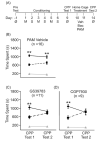Administration of GABA(B) receptor positive allosteric modulators inhibit the expression of previously established methamphetamine-induced conditioned place preference
- PMID: 20804788
- PMCID: PMC2998710
- DOI: 10.1016/j.bbr.2010.08.034
Administration of GABA(B) receptor positive allosteric modulators inhibit the expression of previously established methamphetamine-induced conditioned place preference
Abstract
Little is known about the role of GABA(B) receptors (GABA(B)Rs) in the maintenance of memories associated with using abused substances. We have embarked on a series of studies designed to determine if enhancing the efficacy of GABA-occupied GABA(B)Rs with positive allosteric modulators (PAMs) can negate previously established conditioned place preference (CPP) induced by methamphetamine. In the current study, we evaluated the effects of acute administration of GABA(B)R PAMs, GS39783 and CGP7930. We determined that post-conditioning treatments with these PAMs, administered in the home cage, blocked the subsequent expression of methamphetamine-induced CPP. These data indicate that selectively augmenting GABA-occupied GABA(B)R signaling is sufficient to reduce memory maintenance and/or the salience of contextual cues previously associated with methamphetamine.
Copyright © 2010 Elsevier B.V. All rights reserved.
Figures

Similar articles
-
The GABA-B positive modulator GS39783 decreases psychostimulant conditioned-reinforcement and conditioned-reward.Addict Biol. 2011 Jul;16(3):416-27. doi: 10.1111/j.1369-1600.2010.00278.x. Epub 2011 Feb 11. Addict Biol. 2011. PMID: 21309927
-
Reducing effect of the positive allosteric modulators of the GABA(B) receptor, CGP7930 and GS39783, on alcohol intake in alcohol-preferring rats.Eur J Pharmacol. 2005 Nov 21;525(1-3):105-11. doi: 10.1016/j.ejphar.2005.10.005. Epub 2005 Nov 14. Eur J Pharmacol. 2005. PMID: 16289452
-
Effect of fendiline on the maintenance and expression of methamphetamine-induced conditioned place preference in Sprague-Dawley rats.Psychopharmacology (Berl). 2014 May;231(9):2019-29. doi: 10.1007/s00213-013-3347-7. Epub 2013 Nov 22. Psychopharmacology (Berl). 2014. PMID: 24264565 Free PMC article.
-
Potential of GABAB Receptor Positive Allosteric Modulators in the Treatment of Alcohol Use Disorder.CNS Drugs. 2019 Feb;33(2):107-123. doi: 10.1007/s40263-018-0596-3. CNS Drugs. 2019. PMID: 30604283 Review.
-
Positive allosteric modulators of the GABAB receptor: a new class of ligands with therapeutic potential for alcohol use disorder.Alcohol Alcohol. 2024 Mar 16;59(3):agae018. doi: 10.1093/alcalc/agae018. Alcohol Alcohol. 2024. PMID: 38566580 Review.
Cited by
-
Using conditioned place preference to identify relapse prevention medications.Neurosci Biobehav Rev. 2013 Nov;37(9 Pt A):2081-6. doi: 10.1016/j.neubiorev.2013.05.002. Epub 2013 May 13. Neurosci Biobehav Rev. 2013. PMID: 23680702 Free PMC article. Review.
-
Mitochondrial function influences expression of methamphetamine-induced behavioral sensitization.Sci Rep. 2021 Dec 31;11(1):24529. doi: 10.1038/s41598-021-04301-9. Sci Rep. 2021. PMID: 34972820 Free PMC article.
-
The Role of Chinese Herbal Therapy in Methamphetamine Abuse and its Induced Psychiatric Symptoms.Front Pharmacol. 2021 May 10;12:679905. doi: 10.3389/fphar.2021.679905. eCollection 2021. Front Pharmacol. 2021. PMID: 34040537 Free PMC article. Review.
-
The role of the GABA system in amphetamine-type stimulant use disorders.Front Cell Neurosci. 2015 May 5;9:162. doi: 10.3389/fncel.2015.00162. eCollection 2015. Front Cell Neurosci. 2015. PMID: 25999814 Free PMC article. Review.
-
Parkin regulates drug-taking behavior in rat model of methamphetamine use disorder.Transl Psychiatry. 2021 May 17;11(1):293. doi: 10.1038/s41398-021-01387-7. Transl Psychiatry. 2021. PMID: 34001858 Free PMC article.
References
-
- O’Brien CP, Childress AR, McLellan AT, Ehrman R. Classical conditioning in drug-dependent humans. Ann N Y Acad Sci. 1992;654:400–15. - PubMed
-
- Ehrman RN, Robbins SJ, Childress AR, O’Brien CP. Conditioned responses to cocaine-related stimuli in cocaine abuse patients. Psychopharmacology (Berl) 1992;107:523–9. - PubMed
Publication types
MeSH terms
Substances
Grants and funding
LinkOut - more resources
Full Text Sources
Other Literature Sources
Medical

